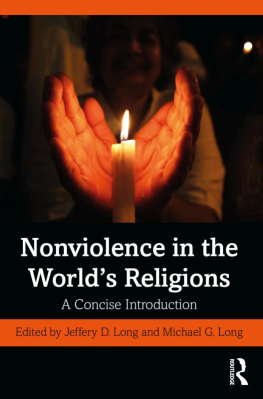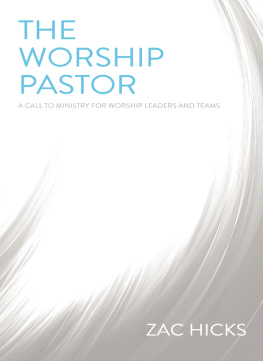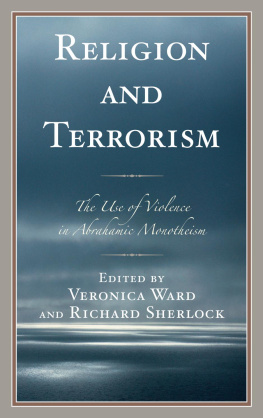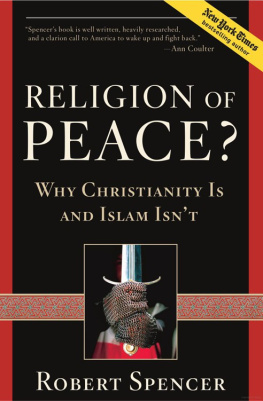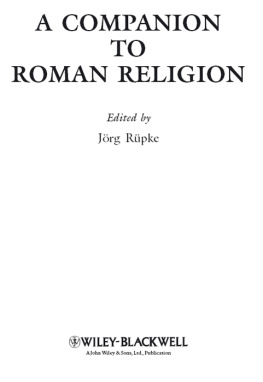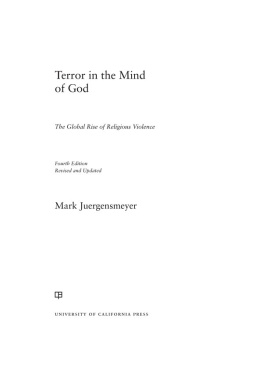FEW CALL IT WAR
Robert Hicks has written a masterpiece in the study of religiously motivated terrorism. He has been fair in his critique of all religious violence, including movements within Judaism and even Christianity, yet avoids the type of moral equivalence that political correctness calls forwhere a lone wolf like Timothy McVeigh is regarded as no less dangerous than the leaders of al Qaeda or ISIS.
Robert L. Brennemann, PhD, Professor, Intercultural Studies,
North Central University, Author, As Strong as the Mountains:
Kurdish Cultural Journey
In a time when political leaders are reluctant to talk about faith, Dr. Hicks opens our eyes to the truth about religious terrorism. He brings great academic acumen as a history professor and practical experience as a military chaplain to answer the question For what would I be willing to kill someone? A must read for those of all faiths, no faith, and evangelicals who love their country
Chaplain, Major General Charles C. Baldwin, USAF (Retired)
The mixture of political ideology, religious values, and the willingness to engage in premeditated violence against innocent people for political gain is the combustible cocktail of religiously motivated terrorism. Dr. Hicks presents a highly readable and well-documented account of the use and abuse of religion for violent political ends. He reminds us that no religion is immune from violence and that values have consequences. This is a book well worth reading. You will not be disappointed
Timothy J. Demy, ThD., PhD, Co-author,
In the Name of God: Understanding the Mindset of Terrorism
Chaplain Hicks factors in what so many experts leave out the critical role religion plays in the modern terrorist mind. His concluding out of the box counter measures are worth the price of the book
Major General, John M. White, Air National Guard (Retired),
Former ANG Assistant to Air Combat Command, Commander
Chaplain Hicks has written a book that must be read by military personnel, law enforcement officers, and anyone who seeks to understand the terrorism we are seeing around the world every day. This is an objective and thoroughly researched book that dives deep into the details of the worlds main religions and describes how both in the past and today these religions impact the nature of extremist terrorism that far too many seem to be afraid to tie to its religious roots and motivations. It is refreshingly frank and informative and I highly commend it to everyone who wants to learn more about extremism and religiously motivated terrorism.
Tom Hastings, US State Department Counterterrorism Official, (Retired),
FBI Crisis Management Specialist, (Retired)
FEW CALL IT
WAR
Religious Terrorism:
Then and Now
Robert Michael Hicks
New York
FEW CALL IT WAR
Religious Terrorism: Then and Now
2016 Robert Michael Hicks.
All rights reserved. No portion of this book may be reproduced, stored in a retrieval system, or transmitted in any form or by any meanselectronic, mechanical, photocopy, recording, scanning, or otherexcept for brief quotations in critical reviews or articles, without the prior written permission of the publisher.
Published in New York, New York, by Morgan James Publishing. Morgan James and The Entrepreneurial Publisher are trademarks of Morgan James, LLC.
www.MorganJamesPublishing.com
The Morgan James Speakers Group can bring authors to your live event. For more information or to book an event visit The Morgan James Speakers Group at
www.TheMorganJamesSpeakersGroup.com.
 | ISBN 978-1-63047-785-1 paperback ISBN 978-1-63047-786-8 eBook ISBN 978-1-63047-787-5 hardcover Library of Congress Control Number: 2015914862 Cover Design by: John Weber Interior Design by: Bonnie Bushman |
In an effort to support local communities and raise awareness and funds, Morgan James Publishing donates a percentage of all book sales for the life of each book to Habitat for Humanity Peninsula and Greater Williamsburg.
| Get involved today, visit
www.MorganJamesBuilds.com | |
Dedication
Charis Cathryn Hicks Pierson
March 19, 1971-February 10, 2004
CHAPTER ONE
The Blinders Were On Prior to 9/11
A wakened by a boom boom boom, I quickly looked at my watch. It was 5:30 in the morning. Rushing to the door of my thatched enclosure, I saw nothing. I had no idea what had happened until I dressed and walked to our kibbutz breakfast at eight oclock. Over a Mediterranean breakfast of boiled eggs, cheese, and juice, I learned the news. A cadre of Islamic terrorists had come ashore across from Camp Achiev, where I was spending the night with other students. They had been spotted by Israeli naval forces.
The booms I had heard were the sounds of Israeli gunboats zeroing in on the hostile intruders. The only populated area in the region was the very camp in which I was spending the night. The targeted victims were self-evident. Within an hour or so, news cameras were on scene reporting the incident. The speed with which they arrived amazed the whole community at Camp Achiev. It was my first close call with Middle East terrorism.
Its one thing to read about such events or to watch the repeated images on television. But when I realized the terrorists were coming for me and my companions, everything changed. After the explosion a deflated dinghy was pulled ashore, loaded with all kinds of explosives, AK-47s and grenades. It was a direct confrontation with reality and with my own mortality.
An appalling irony immediately struck me. I was in Israel in 1980 to study its geography with primary interest in Biblical history. Suddenly I was confronted not with identification of Biblical sites but with contemporary geopolitical issues. In that moment over breakfast, I felt like a nave victim of something much larger than myself. Being a student of ancient history did not make me immune to current history.
Years later I led a small group of adults on a tour of Israel. I had planned a day of walking around the old city of Jerusalem, complete with lectures at the famous Biblical gates. While driving from our hotel to the old city, we turned toward the New Gate passing the Notre Dame Hospice. Suddenly an angry crowd of black-hatted Hasidic Jews confronted us with stones in hand. As I waited for the light to change I noticed the car in front of our VW bus had Palestinian license plates. Immediately, the Hasidic Jews hurled stones at that car. I looked over at my guide, a former student, friend, and reservist in the Israeli army. I blurted out, What do I do now? Without acknowledging my request or even looking at me, he lowered his head and started praying! As I looked to him desperately for direction, he merely prayed for Gods protection. I had to confess later that I was looking for some military tactic to get us out of there, not prayer! But his prayer must have worked. As the Hasidic crowd pounded the car in front of us with stones, not one rock hit our bus. As we drove around the corner, we breathed a sigh of relief, realizing we had been spared, while also wondering about the fate of the Palestinians in the car. At that moment I again realized the ever-present realities of being in the Middle East. Terrorism not only comes from the PLO (Palestinian Liberation Organization) Muslims, but also from Israeli Jews religious, orthodox, yarmulke-wearing Jews.



